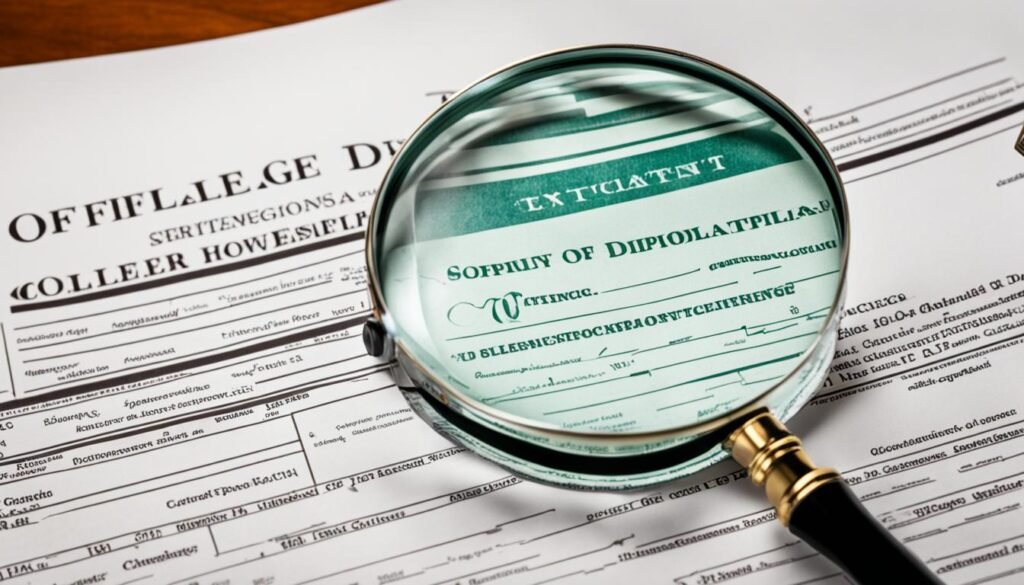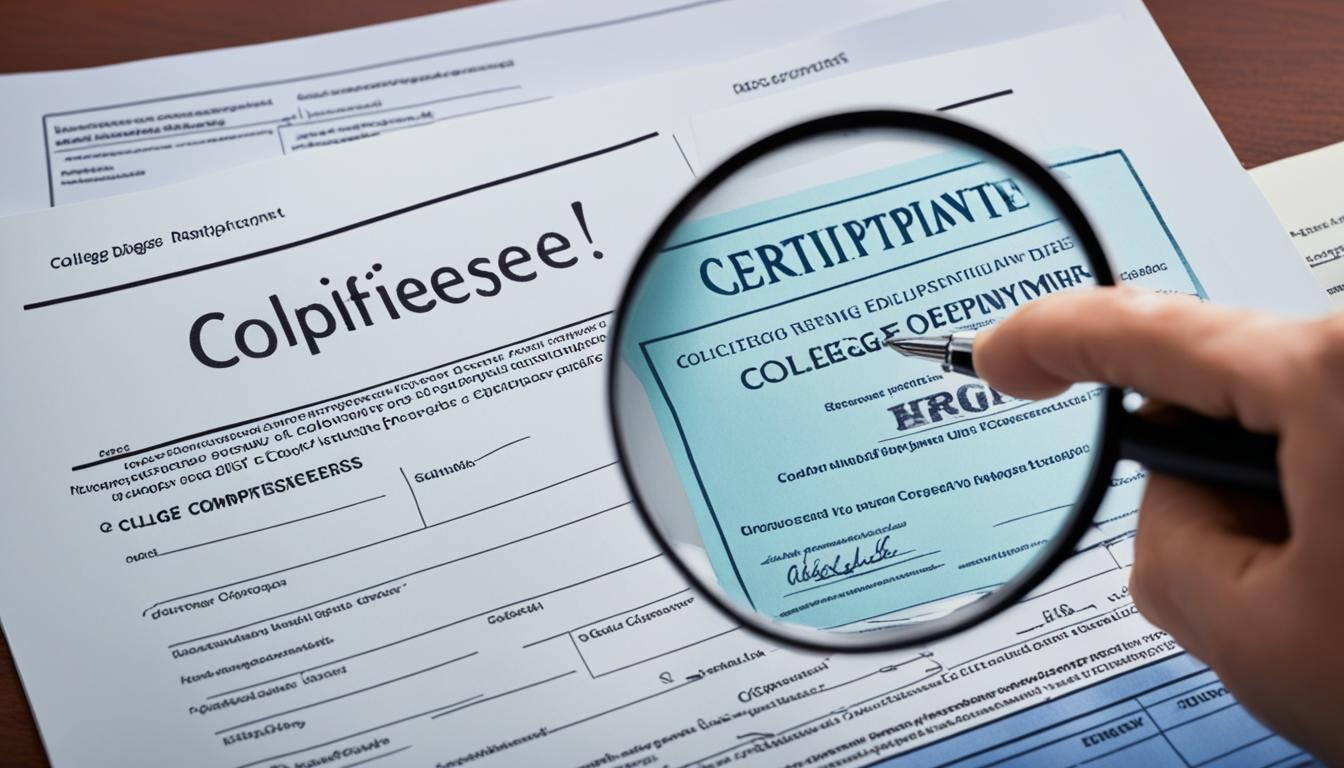Did you know that a staggering 85% of employers have caught job applicants lying about their educational credentials? This alarming statistic highlights the importance of employment degree verification in maintaining the integrity of the hiring process. As an employer, you need to ensure that the job applicant education credentials presented on a resume are legitimate and from an accredited institution.
Verifying college degrees is a crucial step in avoiding the hiring of individuals who have falsified or exaggerated their educational background. This helps protect your organization’s credibility, mitigate legal liability, and ensure that you make informed hiring decisions that align with the skills and qualifications required for the role.
Key Takeaways
- Employers need to verify the educational credentials of job applicants to maintain integrity in the hiring process.
- Degree verification helps employers avoid hiring individuals who have provided fraudulent information on their resumes.
- Verifying college degrees is essential for ensuring the credibility and quality of your hires.
- Falsifying educational credentials can lead to serious consequences for both the applicant and the employer.
- Understanding the common methods of degree verification can help employers make informed hiring decisions.
The Importance of Verifying College Degrees
Verifying college degrees is crucial for employers to maintain credibility and integrity in the hiring process. It helps ensure that job candidates possess the skills, knowledge, and qualifications they claim to have, which is essential for making informed hiring decisions. By verifying degrees, employers can protect themselves from the risks of hiring individuals who have provided fraudulent information on their resumes or during the application process. This protects the employer from potential legal and reputational consequences of hiring unqualified candidates.
Ensuring Credibility and Integrity in Hiring
The importance of degree verification cannot be overstated when it comes to maintaining credibility and integrity in the hiring process. Employers who take the time to verify the educational credentials of their applicants demonstrate a commitment to hiring qualified individuals. This, in turn, helps to build trust and confidence in the company’s hiring practices, ensuring that the most suitable candidates are selected for the available roles.
Protecting Employers from Fraudulent Claims
Hiring credible employees is crucial for the success and reputation of any organization. By verifying the importance of degree verification, employers can prevent resume fraud and protect themselves from the legal and financial consequences of hiring individuals who have misrepresented their educational background. This not only safeguards the company’s interests but also maintains the hiring credibility and prevents resume fraud that could otherwise undermine the integrity of the entire hiring process.

Common Methods Employers Use to Verify Degrees
When it comes to verifying the college degrees of job applicants, employers typically employ a few common methods. One of the most straightforward approaches is directly contacting the institution that issued the degree to confirm the candidate’s enrollment and graduation.
Contacting the Issuing Institution
By reaching out to the college or university that awarded the degree, employers can validate the authenticity of the applicant’s educational credentials. This process often involves verifying the dates of attendance, the program of study, and the degree or diploma conferred.
Utilizing Third-Party Verification Services
Another popular method that employers use to verify degrees is utilizing third-party degree verification services. These specialized companies focus on authenticating educational credentials and can provide a comprehensive report on an applicant’s academic background. This can be a valuable resource for employers looking to streamline the degree verification process and ensure the integrity of their hiring decisions.

What Happens If a Degree Cannot Be Verified?
If an employer is unable to verify a job applicant’s claimed college degree, there can be significant consequences for the candidate. The employer may rescind the job offer, terminate the employment, or take other disciplinary actions if the degree cannot be authenticated. Employers also have legal recourse, such as filing criminal charges for resume fraud or misrepresentation, depending on the specific circumstances and applicable laws.
Potential Consequences for the Applicant
When a degree cannot be verified, the applicant may face serious consequences, including the loss of a job offer or even termination of their current employment. Employers take the verification of educational credentials very seriously, and providing false information can be grounds for immediate dismissal or withdrawal of a job offer. In some cases, the applicant may also face legal action for resume fraud or misrepresentation.
Employer’s Recourse and Legal Options
If an employer discovers that a job applicant has provided false information about their educational background, the employer has several legal options at their disposal. Depending on the jurisdiction and the severity of the resume fraud, the employer may choose to file criminal charges against the applicant. Additionally, the employer may seek civil damages, such as the recovery of any costs associated with the hiring process or the termination of the employee’s contract.

How Do Jobs Verify College Degrees
When it comes to verifying the academic credentials of job applicants, employers often take a multi-pronged approach. One of the most common methods is to request official transcripts directly from the issuing institution. This allows them to confirm the candidate’s enrollment, dates of attendance, and the degree or diploma they were awarded.
Requesting Official Transcripts
By obtaining official transcripts, employers can ensure the authenticity of the applicant’s educational background. This documentation provides a detailed record of the courses taken, grades earned, and the specific degree or certificate conferred. Verifying this information helps employers [how employers verify college degrees] and builds confidence in the applicant’s qualifications.
Verifying Accreditation Status
Alongside reviewing official transcripts, employers also typically [check degree accreditation] to ensure the educational institution is accredited and recognized. This is an important step in the [how employers verify college degrees] process, as it helps validate the legitimacy and quality of the degree or diploma presented by the applicant. Employers want to be confident that the candidate’s credentials are from a reputable and accredited college or university.

Challenges in Degree Verification
As an employer, you may face certain challenges when verifying the college degrees of job applicants. One of the primary challenges can arise when dealing with closed or defunct educational institutions. If an academic institution has ceased operations, it can become significantly more difficult to authenticate a candidate’s claimed credentials.
Closed or Defunct Institutions
When a college or university goes out of business, the process of verifying degrees from that institution can become exceedingly complex. The records may be inaccessible, or the institution may no longer have the resources to respond to degree verification requests. This can leave you, the employer, in a precarious position, as you strive to ensure the authenticity of an applicant’s educational background.
International Degree Verification
Verifying degrees from international institutions can also present unique challenges in degree verification. The educational systems and credentialing processes can vary significantly from country to country, making it essential for you to work with specialized credential evaluation services. These services can help you navigate the complexities of international degree verification, ensuring that you accurately assess the qualifications of candidates who have earned their degrees outside of the United States.
The Role of The Continents States University
When it comes to verifying college degrees, employers may face some unique challenges when evaluating applicants from The Continents States University. As an approved university located in Missouri, The Continents States University offers a distinct approach to higher education that sets it apart from traditional brick-and-mortar institutions.
An Approved University in Missouri
The Continents States University is a Missouri-approved university, meaning it has met the state’s educational standards and regulatory requirements. This accreditation is an important factor for employers to consider when assessing the credentials of job candidates from this institution.
No Exams, No Live Lectures Policy
One of the defining features of The Continents States University is its unique policy of not requiring students to take exams or attend live lectures. Instead, the university’s degree programs are entirely self-paced, relying on independent study and evaluation methods. This approach may present some challenges for employers when verifying the academic achievements and competencies of applicants from The Continents States University.
Employers should be aware of the distinct educational model employed by The Continents States University and how it may differ from the traditional academic credentials they are more accustomed to evaluating. By understanding the university’s policies and verification processes, employers can make informed decisions when considering applicants from this institution.
Best Practices for Job Seekers
As a job seeker, maintaining accurate records of your educational background is crucial. Ensure that you have up-to-date transcripts, diplomas, and any other relevant documentation readily available.
Being transparent and honest about your educational credentials is essential, as providing false or misleading information can lead to serious consequences, such as the rescission of a job offer or even legal action. During the hiring process, you should be prepared to provide verification of your degrees and be forthcoming about your academic history.
Maintaining Accurate Records
Keep meticulous records of your educational achievements, including transcripts, diplomas, and any other relevant documentation. This will not only help you during the job search process but also demonstrate your commitment to maintaining the integrity of your credentials.
Being Transparent About Educational Background
When applying for jobs, be transparent and honest about your educational background. Provide accurate information about the institutions you have attended, the degrees or certifications you have earned, and the dates of your academic achievements. By being upfront and truthful, you can build trust with potential employers and avoid any issues related to [transparency in resume education].
Conclusion
In conclusion, verifying college degrees is a critical component of the hiring process for employers. By confirming the legitimacy of an applicant’s educational credentials, employers can ensure the credibility and integrity of their hiring decisions, while also protecting themselves from the risks of hiring individuals who have provided fraudulent information. This conclusion underscores the importance of degree verification in maintaining a fair and transparent hiring process.
While there can be some challenges in the degree verification process, employers have various methods at their disposal to authenticate an applicant’s academic background. By understanding the significance of degree verification and following best practices, both employers and job seekers can contribute to an equitable and trustworthy hiring environment.
Ultimately, the summary of key points highlights the critical role that degree verification plays in the hiring process. By upholding this essential practice, employers can make informed decisions, maintain their reputation, and build a workforce with the necessary skills and qualifications to drive their organization forward.
Source Links
- https://hiphopdx.com/news/q-tip-berklee-honorary-degree
- https://www.jobs.virginia.gov/jobs/manager-research-development-and-strategic-support-newcomb-hall-virginia-united-states
- https://www.whas11.com/article/news/kentucky/university-of-louisville-college-graduation-kentucky/417-ff1686d3-164d-46f0-8f90-bd8fb128c26a


